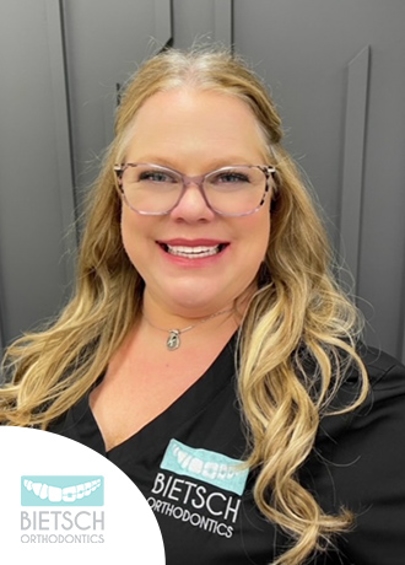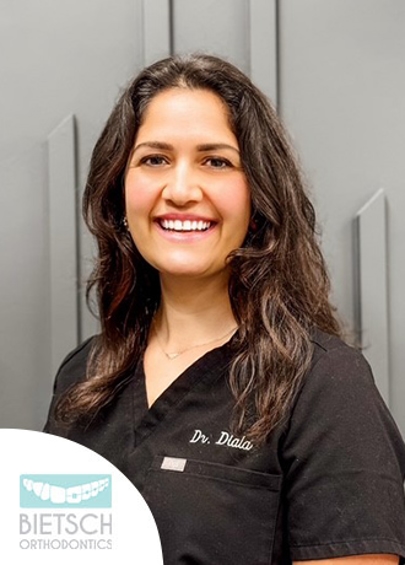
New & Existing Patient Information
Your Visit at Our Prosper Office
Whether you are a returning or new patient, at Bietsch Orthodontics, we are always happy and excited to welcome you. Our ultimate goal is to give our patients the beautiful, straight, and healthy teeth they’ve always wanted. Our compassionate team will work closely with you every step of the treatment process to ensure you’re receiving nothing but the best in modern orthodontic care.
A reason why our team is able to provide excellent orthodontic care for children, teens, and adults, is our belief in developing a personal relationship with each patient. This enables us to understand our patients' concerns and goals and produce the best possible outcome. We encourage you to use this page as a resource to find information on new patient forms, as well as learn about our financing options and more.
Call (972) 934-6222or contact us onlineto schedule a free consultation and meet our outstanding staff in Prosper, TX.
New Patients
Every new patient starts with a complimentary consultation; which will give you the opportunity to meet our staff and Dr. Bietsch, as well as take a tour of our state-of-the-art facility and ask any questions you may have about our practice and treatments. For the more personal experiences, Dr. Bietsch even has a dedicated area for your private consultation where you can work and make the treatment planning decisions together.
Before your initial visit, we also ask that you please download and fill out our new patient forms and bring them with you to our office. This will speed up the registration process once you get here and will make your appointment much quicker!
Financial Information
We believe high quality orthodontic care should be accessible to everyone. That’s why we offer payment plans to fit your budget and make treatments affordable for you and your whole family.
We currently offer the following payment methods:
- Check
- Cash
- Credit Card
- Flex Spending
- Interest-Free Financing
- HSA Accounts
Additionally, we are in network with several in-network insurance providers and will gladly accept all PPO plans, as well as submit insurance claims and accept assignment of benefits as a courtesy to our patients.
Emergency Dental Care
We understand that accidents happen and having an emergency dentist can be so beneficial to the health of your teeth. Trauma to the mouth can cause panic in parents and children, but staying calm is the best way to approach any dental emergency. If you think you may be experiencing an urgent oral issue, please contact our office as soon as possible, our staff will be happy to help you either on the phone or in-person.
Make an appointment today and become part of the Bietsch Orthodontics family today by calling (972) 934-6222 or contacting us online.
```
Building Confidence, One Smile at a Time!
-
Braces BusCall us at (972) 934-6222 to find out more and schedule a consultation today!
-
New & Existing PatientsResources for All Your Orthodontic Needs
-
Community InvolvementThe Many Ways We Give Back
-
Meet Our TeamThe Bietsch Orthodontics Team
Our Smile Specialists
Experienced & Caring
-
 Dr. Tom BietschOrthodontist, Owner
Dr. Tom BietschOrthodontist, Owner -
 KirstenBrace Bus Specialist, Front Team Lead
KirstenBrace Bus Specialist, Front Team Lead -
 MonicaFinancial Coordinator
MonicaFinancial Coordinator -
 WillowFinancial Team Lead
WillowFinancial Team Lead -
 ESPiNMascot
ESPiNMascot -
 Dr. Diala ChanineOrthodontist
Dr. Diala ChanineOrthodontist
Have Questions? We Have Answers!
-
If I have braces, do I still need dental checkups every six months?You should continue with regular dental visits and cleanings every 6 months. Some patients will need to increase the number of times they receive professional cleanings to every 3-4 months to help maintain good gum health since it is slightly more difficult to keep teeth and gums clean with braces.
-
Do I need to brush my teeth more often if I have braces?With braces, you should brush your teeth at least three times a day to keep your teeth, gums, and mouth healthy and clean. You should also floss daily to get in between your braces where your brush isn't able to reach. Electric toothbrushes, such as Sonicare, and waterpicks are excellent and help to keep your teeth and gums clean and healthy.
-
Do Braces Hurt?You will feel soreness with your new braces due to the small amount of discomfort as your teeth, gums, cheeks, and mouth get used to your new braces. It generally a few days depending on the patient.
-
Do I need retainers?Teeth are moving throughout life regardless if you have had braces or not due to the extraordinary amount of pressure we put on our teeth. Therefore, retainers are vital to maintaining the position of your teeth after braces are removed and beyond. It is recommended to wear them all the time once braces are removed and eventually, you can wear them just at night once instructed.
-
If I break part of my braces or have an emergency, what should I do?Rarely do true orthodontic emergencies occur, however when they do we are here to make sure they are taken care of for you. Call our office and we make arrangements to see you and make you comfortable.
There are some things that can be done to make your braces feel better until we see you.
Broken/loose bracket: Remove the bracket if possible place it into a bag and bring it with you to your next appointment.
Pokey wire: Use wax to stick on the area until we see you. If the wire has moved to one side or has come out of the bracket in the back, use needle-nose pliers to put the wire back in back bracket or shift it back to the other side. If that does not work cut the wire with fingernail cutters or wire cutters and pull the wire out to make yourself comfortable.
After alleviating your discomfort, it is very important that you still call our office as soon as possible to schedule a time to repair the problem. Allowing your appliance to remain damaged for an extended period of time may result in disruptions to your treatment plan. -
How long does an average patient wear braces?Every treatment plan is different and everyone’s teeth move a little differently, however, most treatment times are from 15-24 months.
-
What foods can I not eat?A simple rule to follow is to avoid anything that is hard, sticky, or chewy. These foods can cause damage to the braces and can cause treatment time to be extended. Examples of foods to avoid are candy, popcorn, a hard pizza crust, ribs on the bone, and gum.
-
Will my braces interfere with my school activities like sports, playing an instrument, or singing?Braces will not interfere with any school activities, however, there is an adjustment period of getting used to them when playing an instrument and singing. When playing most sports, a mouthguard to protect your teeth and braces is recommended and will not prevent you from participating.
-
What is a "Two-Phase" Orthodontic Treatment?
This refers to two separate times when a child receives orthodontic treatment
The first phase of treatment is done when the child still has baby teeth and the focus is on bone changes, growth modification, and tooth guidance. This generally includes orthodontic appliances and may or may not include braces on the permanent teeth. The advantages of doing phase I treatment include:
• influence jaw growth in a positive manner
• improve the width of the dental arches
• reduce the need to extract permanent teeth
• reduce or eliminate the need for jaw surgery
• lower the risk of trauma to protruded front teeth
• correct harmful oral habits
• improve esthetics and self-esteem
• simplify and shorten treatment time for definitive orthodontic treatment (phase II)
• increase stability of final treatment results
• reduce the likelihood of impacted permanent teeth
• improve speech development
• improve the position of the first molars
• guide permanent teeth into more favorable positions
• improve lip competence
• preserve or gain space for erupting teeth
• improve compliance before the busy teenage years
The second phase of treatment is started when the child has most or all of their permanent teeth. This entails moving all the teeth either with braces or aligners and sometimes includes appliances. -
What's the best age to visit the Orthodontist?
Just about everyone can benefit from orthodontic treatment at some point in their life. There is no wrong age to see an orthodontist to be evaluated to improve the look and feel of your smile or improve your bite.
The American Association of Orthodontists and the American Dental Association recommends that children be seen by an orthodontist by the age of seven to be sure that the teeth and bones are developing properly.













